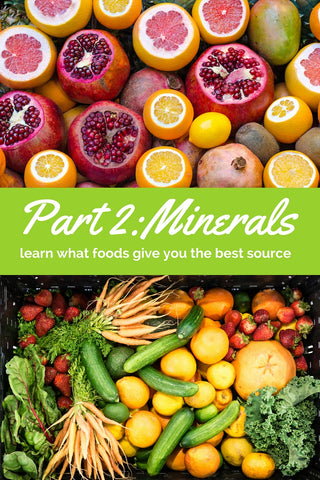Part 2: Minerals - Learn What Foods Give You the Best Source
 In part 1, we discussed the different vitamins and how to incorporate them into your diet by choosing the best food sources. This time around, we’re looking at the minerals out there and how you can maximize your intake by following our list of foods for each category. Did you miss Part 1: Vitamins? You can check it out right here. Again, just like last time, in order to provide you with the ultimate best food choices, to make our list the food sources had to provide at least 50% of the dietary reference intake (per the USDA) in one serving. Take a look at part 2!
In part 1, we discussed the different vitamins and how to incorporate them into your diet by choosing the best food sources. This time around, we’re looking at the minerals out there and how you can maximize your intake by following our list of foods for each category. Did you miss Part 1: Vitamins? You can check it out right here. Again, just like last time, in order to provide you with the ultimate best food choices, to make our list the food sources had to provide at least 50% of the dietary reference intake (per the USDA) in one serving. Take a look at part 2!
Minerals
Calcium
Why you need it—it makes our bones strong! 99% of our body’s calcium content can be found in our bones and teeth. What may not be so well-known is that it also aids in our blood’s pH balance and muscle and nerve function. Where you can get it—yup, you guessed it, milk! But this is where it gets a little tricky, since some milk, and enough of it, can provide you with your daily needs of calcium, but also note that you can get your calcium from types of tofu as well!
Copper
Why you need it—it works together with iron to form red blood cells, so consuming foods high in copper can help with anemia. Although many people do not get enough copper in their diet, it is rare to be truly deficient. Where you can get it—seafood, such as oysters, red meat, sunflower and sesame seeds, tempeh, garbanzo and soybeans, cashews, shiitake mushrooms, lentils, and walnuts.
Fluorine
Why you need it—protect your teeth from decay. Where you can get it—fluorinated water as well as tea leaves.
Iodine
Why you need it—it is essential for the production of thyroid hormones in producing energy, with the thyroid gland containing about 70-80% of your body’s iodine at any given time. Where you can get it—sea vegetables (seaweed), scallops, cod, iodized salt, and yogurt.
Iron
Why you need it—it is responsible for carrying oxygen-rich blood to your cells and has a role in producing the body’s energy source (ATP). Where you can get it—red meat, poultry, fish, shellfish, soybeans, and fortified breakfast cereals.
Magnesium
Why you need it—it’s important for proper organ function, especially the heart, muscles and kidneys, and in addition helps activate enzymes and regulate levels of other minerals throughout the body. Where you can get it—pumpkin seeds, spinach, Swiss chard.
Phosphorus
Why you need it—about 80% of your body’s phosphorus content lies in the bones and teeth, so it too plays a strong role alongside calcium, and in addition helps filter out waste in the kidneys. Where you can get it—a good rule of thumb is looking for protein-rich foods, so try scallops, sardines, soybeans, pumpkin seeds, cod, tuna, salmon, lentils, and shrimp.
Potassium
Why you need it—we need this mineral for proper digestive and muscle functioning, and in addition low levels of potassium have been linked to high blood pressure. Where you can get it—yes, we all know bananas have potassium, but there are some other food sources richer in potassium that might surprise you. While there isn’t one food source that will give you all your daily potassium needs in a single serving, you can still get a good amount from beet greens, lima beans, Swiss chard, potatoes and sweet potato, spinach, and avocado.
Selenium
Why you need it—it works along with vitamin E to prevent the damage of free radicals in the body, in addition to playing a role in thyroid and immune system functioning. Where you can get it—look for meat and fish here, especially tuna, shrimp, sardines, salmon, turkey, cod, chicken, and lamb. But wait, if you’re looking for an alternative, Brazil nuts provide over 700% of your daily value!
Sodium
Why you need it—it works alongside potassium to regulate the body’s fluid balance in addition to aiding in nerve and muscle function. Where you can get it—table salt, seafood, and cheese.
Zinc
Why you need it—it plays a large role in immune system functioning and also supports normal growth and development. Where you can get it—red meats and some cheeses are a good source, although by far oysters are the richest source of zinc.
- Kate Hurd

 In part 1, we discussed the different vitamins and how to incorporate them into your diet by choosing the best food sources. This time around, we’re looking at the minerals out there and how you can maximize your intake by following our list of foods for each category. Did you miss Part 1: Vitamins? You can check it out right
In part 1, we discussed the different vitamins and how to incorporate them into your diet by choosing the best food sources. This time around, we’re looking at the minerals out there and how you can maximize your intake by following our list of foods for each category. Did you miss Part 1: Vitamins? You can check it out right 





Comments 0